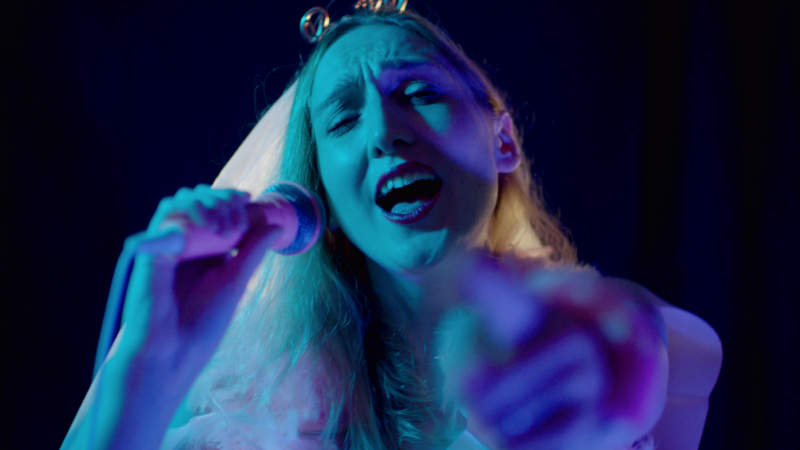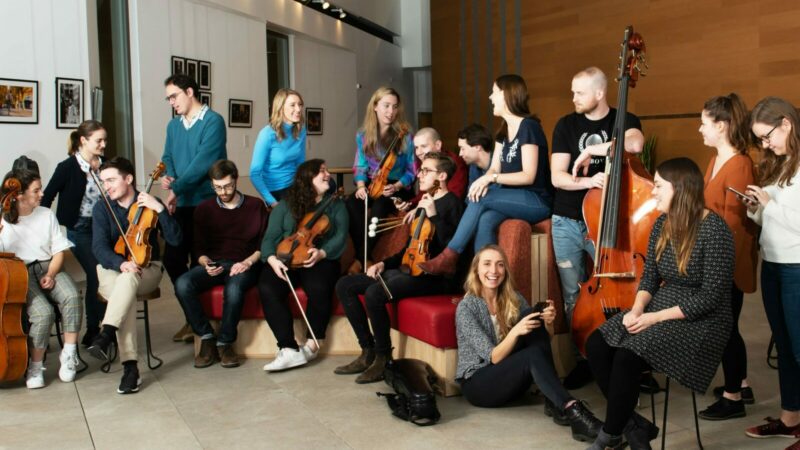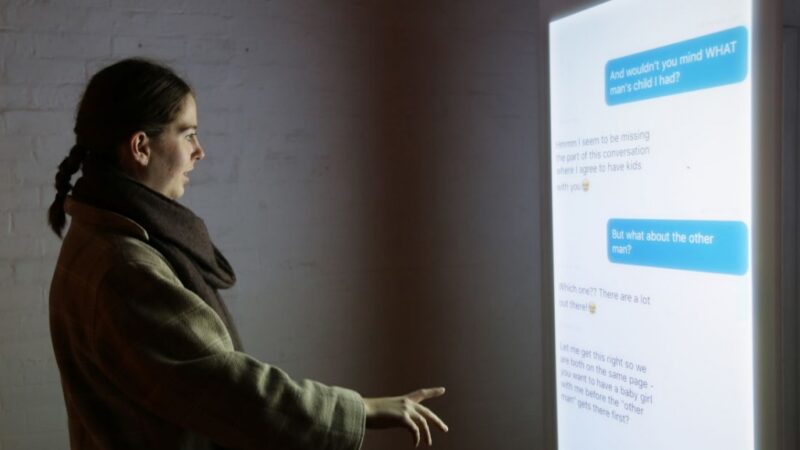Lessons from lockdown: how Theatre Uncut’s ‘Bubble’ led the way in virtual delivery of socially distanced theatre.
Since the coronavirus lockdown began, we’ve all become used to seeing theatre online and plays that are made using actors filming themselves on their smartphones. Theatre Uncut’s play Bubble, though, was the first – literally. “It launched as Boris was doing the lockdown speech,” says Emma Callander, co-artistic director.
“We were in the midst of the premiere on Facebook,” she remembers. “Twenty minutes in, Boris did his speech. We were worried that we’d totally lose our audience, but we didn’t.”
Kieran Hurley’s play centres around what happens when a university professor refers to a student as ‘a slut’. The plot is about how that comment spreads, and the drama is about how it affects that student, all students, lecturers and the professor himself.
“The play is written like Facebook comments,” explains producer Michael Orwell who worked on the project/commission on behalf of The Space, “with text-speak and emojis on screen. When we got involved, the main question was about the format of it and what people will see. That was a key area of development.”
Theatre Uncut has previously made short plays of around five minutes long, typically aimed at starting debates and provoking thinking. To help make that happen, the company encourages universities and other organisations around the world to make their own versions of the plays.
“We always produce our own work at the same time as putting it out for anyone to do it themselves, so long as they don’t make a profit,” explains Callander. “It’s important to us that the conversations are being had.”
The cast filmed themselves
Bubble is the company’s first move into longer-form theatre but it was made with the same aims and when The Space got involved, it also became about how to amplify the way students around the world could be involved. It developed into a production where, through physical practicality, the entire cast ended up filming themselves wherever they were.
Seen now, it’s a clear forerunner of every lockdown drama that’s followed since, but the ambition was to explore how technology was already bringing people together –– and keeping them apart, too.
“It’s suddenly part of the landscape,” says Callander. “We didn’t have much to compare it to when we were making it, whereas now we’ve got hundreds of things being shot remotely.”
There were discussions about having live performances with the two main characters on stage and all the others calling in from around the world. Even before COVID-19 could make that impossible, though, the practicalities of relying on multiple Wi-Fi streams meant The Space recommended creating an entirely filmed version.
That raised many other issues, though. “Such as where this space on the internet that the characters are speaking in could be,” explains Orwell. “We discussed what you will see on screen, how the characters would appear, what the visual format would be.”
“Then it was about giving advice to all of the actors about how they could best produce their own performances, making sure that it’s audible and visible, and how they can use the smartphone medium in a way that will be effective,” he says.
Producing Kieran Hurley’s script in this way was complex and having disparate people filming at separate times was logistically complicated. Callander says, though, that the very problems played into exactly what the drama was truly about. “The kind of glitchy disconnect that lives inside performances that aren’t synced up with each other, it all feeds into the idea of connection and true connection,” she says.
A play set on Facebook – written in texts and emojis
Bubble was intended to be shown on Facebook and get perhaps 5,000 views as the start of a programme meant to spark discussions. Instead, it got 175,000 and Callander says it’s now being shown by universities as part of online events that include Theatre Uncut contributing to Q&A webinars.
“We have been talking to a range of people, from students who are totally plugged into the idea of digital theatre to older youth theatre facilitators who are now beginning to explore the idea of creating something that is theatrical but doesn’t have a live audience.”
She says that Bubble is now helping managers start to “get their heads around having something that is theatrical but doesn’t have a live audience.”
Bubble is doing this in part because the coronavirus has made organisations focus on online, but it’s really doing it because it wants to get people thinking about communication. “The play deals with questions of free speech in universities,” says Orwell, “and identity politics, and I think Theatre Uncut is very interested in students watching it and thinking about the way they use social media, the different extremes you can find on there.”
Top tips – Things to think about when filming
- Good sound is important – recording voices very clearly, without background noise, clipping or room reflections is almost more important than the pictures, in terms of conveying story.
- Using table lamps, you can create good lighting effects, even with smartphone cameras which can greatly enhance picture clarity and atmosphere.
- In general, pick a filming orientation (portrait or landscape) and stick to it. A mixed economy can cause hassle in the edit. Although it can be used for artistic effect as well.
- Filming with phone cameras means your character can be anywhere he or she wants. Pick an interesting location that supports the drama but be careful of noise, copyrighted images or background music.
- When creating drama within a digital space, think about all the pieces of ‘furniture’ that will make it feel real – notifications, sound effects, posted links and emojis are all part of the vocabulary of digital discourse.
Hear Emma Callendar talk about creating work for younger audiences on The Space Arts Podcasts.
Read the transcript.
How useful was this resource?




